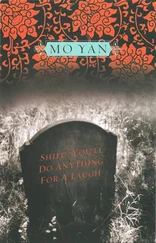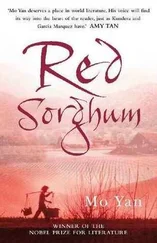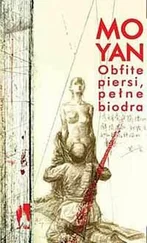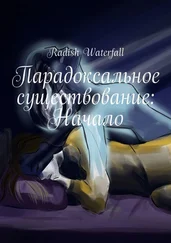Juzi, weeping, rushed over to help the mason to his feet. The pleasure vanished from the blacksmith’s face as he heard her cry, replaced by a look of misery. As he stood there blankly, the mason got to his feet, pushed Juzi’s hands away, scooped up a handful of sand and flung it into the blacksmith’s face, temporarily blinding him. The blacksmith roared like a wild animal and frantically rubbed his good eye. The mason charged, throttling the blacksmith and forcing him to the ground, where he pummelled him as if he were beating a drum.
At that moment, a dark figure burrowed out from between the legs of the crowd. It was Hei-hai. He flew like a bird onto the back of the mason, grabbed his cheeks with hands like black claws and pulled with all his might. The man bared his teeth, parted his lips and screamed — ‘Ow, ow!’ — before thumping to the sandy ground again.
The blacksmith struggled to sit up and began feeling around on the ground for rocks, picking them up and flinging them in all directions. ‘Bastard! Lousy dog!’ Curses flew with the rocks, landing on the onlookers like a hailstorm. They scattered. Juzi screamed, and the blacksmith’s hand stopped dead. Tears had washed the sand out of his eye, which could now see, though not clearly. He saw a white sliver of stone lodged in Juzi’s right eye, as if she’d grown a fungus. With a screech, he covered his eye and fell to the ground, where he writhed in agony.
Hei-hai’s hands relaxed the moment he heard her scream. His fingers had dug two bloody, coal-smeared gouges in the mason’s cheeks. In the midst of chaos, he slinked over to a spot under the bridge and squatted down in the darkest corner he could find to watch the pandemonium at the worksite, his teeth chattering.
There was no sign of the mason or Juzi the next day at the worksite, which was shrouded in gloom. Overhead the sun seemed to be convulsing, while below a bleak autumn wind raised waves in the jute field, over which flocks of sparrows cried out fearfully. The wind raised dust as it passed under the bridge and coloured much of the sky yellow. It did not die down until after nine o’clock, when the sun returned to normal.
When Deputy Director Liu Taiyang, who had returned from his son’s wedding, learned what had happened, he seethed. Standing in front of the forge, he tore into the blacksmith, threatening to gouge out his good eye and give it to Juzi in exchange for the one she’d lost. The blacksmith said nothing in his defence. The pimples on his dark face had turned red. He took in big gulps of air and swallowed big gulps of alcohol.
The masons, driven by demonic energy, worked feverishly. Dull chisels piled up by the forge, waiting to be repaired. The blacksmith lay curled on his bed, swigging alcohol, the bridge opening reeking of it.
Director Liu kicked him furiously. ‘Scared? Or faking it? Do you think playing dead will solve your problem? Get your ass up and repair those chisels. Maybe that will make up for what you did.’
The blacksmith flung his bottle up onto the bridge, where it shattered and rained shards of glass and drops of alcohol onto Director Liu’s head. The blacksmith jumped up and ran out, listing sideways as he shouted, “What am I afraid of? The heavens don’t scare me, death doesn’t scare me either, so what’s there to be afraid of?’ He climbed up to the floodgate. ‘No man scares me!’ He banged into the stone railing and staggered.
‘Watch out, blacksmith,’ people below shouted. ‘You’ll fall.’
‘Me, fall?’ He laughed loud and hard as he climbed onto the railing. Then he let go and stood precariously. The people watching below were frozen, entranced, barely breathing.
He stretched out his arms, flapping them as if they were wings, and started walking along the narrow railing, swaying from side to side. A walk became a saunter, a saunter became a trot. Down below, the people covered their eyes with their hands, but only for a moment.
He wobbled as he ran across the railing. His distorted image was reflected on the surface of the blue water below. He ran from west to east and back, singing.
From Beijing to Nanjing I’ve never seen anyone string up an electric light in their pants, tada, tada, tadac, from Nanjing to Beijing I’ve never seen anyone pull a slingshot out of their pants …
Some intrepid masons ran up to bring the blacksmith down. He fought them. ‘Don’t fuck with me! I’m a champion acrobat. Who’s better, those girls who walk tightropes in movies or me on this railing, tell me that.’ The masons were breathing hard by the time they got him back down under the bridge, where he collapsed onto his bed, foaming at the mouth. He tore at his own throat. ‘Mother!’ he shouted. ‘I can’t take it anymore. Hei-hai, my apprentice, save your master, dig me up a radish…’
The sight of Hei-hai in a coat that reached his thighs surprised the people. It was made of new heavy canvas, durable enough to last five years or more. So little of his shorts showed they could have been mistaken for the hem of the coat. He was wearing a new pair of sneakers that were too big for him, tied so tightly it looked like he was wearing fat-headed catfish on his feet.
‘Did you hear that, Hei-hai? What your master told you to do?’ said an old mason as he poked him in the back with the stem of his pipe.
Hei-hai walked out from under the bridge, clambered up the levee and slipped into the jute field, through which a little path had been worn; plants on both sides leaned away. He walked and walked, stopping next to a spot where the plants had been flattened, as if someone had rolled over them. He rubbed his eyes with the backs of his hands, sobbed briefly, then continued on. A bit farther, he lay on the ground and crawled into the radish field. There was no sign of the skinny old man, so he stood up, walked into the middle of the field and crouched down.
Purple shoots had grown from the wheat seeds sown in the furrows. He fell to his knees and dug up a radish. There was a sound like a bubble popping as the thin roots parted from the earth. Hei-hai raptly followed the sound as it rose into the sky. There were no clouds to impede the falling rays of the bright, glorious autumn sun. He held the radish up to examine it in the sunlight, hoping to see again the strange sight he’d witnessed on the anvil that night; he wanted the sunlit radish he was holding to take on a glittering transparency and emit a golden halo, like the radish now hidden in the river. It disappointed him. It was not transparent, and it was not exquisite. It had no golden halo, much less silvery liquid inside. Again he dug up a radish and held it up to the sun, and again he was disappointed. Things were simple after that: he crawled on his knees, dug up radishes and raised them up to the sun. Tossed them away, crawled some more, dug, raised, examined, tossed.
The eyes of the old man in charge of the field were like pools of murky water. He was crouched in a cabbage patch picking caterpillars. He picked one and pinched it between his fingers, then picked another. It was nearly noon when he got to his feet to wake up the brigade commander, who was sleeping in the watchman’s shed. Unable to sleep the night before, he had chosen the shed for a nap, as the village would be too noisy; the shed was perfect, with its murmur of autumn insects. The old man’s vertebrae cracked as he straightened up. His attention was caught by a red nimbus over the sunlit radish field, as if it were aflame. Shading his eyes, he started walking, quickly arriving at the radish field. There he discovered that the red nimbus came from immature radishes that had been pulled out of the ground.
‘Hey, you!’ he bellowed, spotting the boy kneeling on the ground and holding a large radish up to the sun. His eyes, so big and bright, made the old man uneasy, but that did not stop him from grabbing the boy, jerking him to his feet and dragging him over to the watchman’s shed, where he awakened the brigade commander.
Читать дальше












